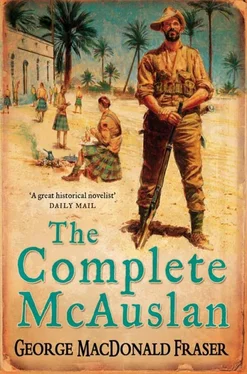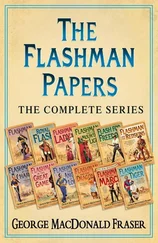It was perhaps the cheekiest piece of ball-juggling that I’ve ever seen; it shook the Fleet momentarily for it seemed to indicate a careless contempt. It said, more clearly than words could have done, that there was no sense of panic in this defence. The Admiral roared with laughter, and I hoped again.
We scored again, just before the interval, a goal against the run of play headed in from a long, free kick, and the teams came off and the Marine band marched up and down playing “Iolanthe”. I stayed where I was, listening to the Governor chattering Good game, good game, my goodness, and the Admiral’s bass rumble, and staring out at the sunlight on the great crowd lining the saucer of the arena. There was no point in my going down to the dressing-room; we were doing well, and nothing I could say could make it better.
The second half began disastrously. A high ball went into our goal-mouth, the centre-half and the Fleet centre went up for it; the sailor came down on his feet and our man on his back. He lay still, and my heart turned over. I watched them lifting him, crowding around, but his head hung forward, and presently they took him behind the goal. “Dirty, dirty!” came the cry from down front, drowned in the answering roar of “Wheel ’im off!” from the Navy. The referee bounced the ball to restart the game, and as the injured man was supported towards the dressing-room I was bounding down the stairs.
He was slightly concussed, the doctor said; he wanted to go back on, but the doctor said it was out of the question. I watched while they bandaged his head, and told him—what I honestly felt—that it didn’t matter a damn about the game. His face took on that look of whining rage that the Glaswegian wears in times of stress, and he said, “We had them bate. We’d’ve sorted them this half.”
Maybe we would, I thought; with ten men it was certain that we wouldn’t now. The doctor broke in to say that he ought to go to bed, and as they took him away I went back to the stand. Dimly I had been aware of the distant roar swelling and dying; when I climbed into my seat we were kicking off again. We were down 4-2.
The Fleet were out for blood now. Even the Admiral was joining in the roar, and the Governor was just sitting eating his hankie. Ten men don’t look very different on the field from eleven; for a time they may even play above themselves, but they don’t win. They never deserve to lose, but they lose.
Oddly enough, we held our own now, and with the tension gone I began to take in details. McGlinchy was playing like an elderly horse; he hadn’t seen much of the ball in the first half, and now he was using it as if it was a landmine, shying away from it, stumbling, and generally living up to the corporal’s expectations. His inside man, little Forbes, was obviously cursing himself hoarse. The crowd enjoyed it.
“Windy!” roared the Fleet.
“Ah, you sharrap! Get back on the front o’ the Players packet!”
“Turn blue, pongoes!”
“Play up,” cried the Governor. “Come along, come along.”
The Admiral said something to him, and they both laughed, and I watched the handkerchief being twisted. There were about fifteen minutes left.
Then it happened, and you can read about it in the files of the Island’s leading daily paper.
McGlinchy got the ball and lost it; it came back to him and he fell over it and it went into touch. The Navy threw in, the ball ran to McGlinchy again, and for once he beat his man and was moving down the wing when a sailor whipped the heels from him. The crowd roared, McGlinchy got up hopping painfully, the Governor exclaimed, “Oh, I say,” and little Forbes went scurrying in, fists clenched, to avenge the foul. Oh no, I said, please God, don’t let Forbes hit him, not out there with everyone looking. Please don’t, Forbes. But the referee was in between, shaking his finger, Forbes was hustled away by his mates, and the referee gave a free kick—against McGlinchy.
It was taken amid much hubbub, and I watched McGlinchy, standing looking puzzled, too surprised to protest, and then his head lifted, and the ball was running towards him. He stopped it, turned, swerved past the halfback, and was away. He could run when he wanted; he swerved infield, then out again towards the flag. The back went sliding in and McGlinchy side-stepped him and came in along the by-line, teasing that he was going to cross the ball, but holding it, like Matthews in his good years.
“Get rid of it!” cried an unhappy voice, but he held it, sand-dancing, looking up, and then he made a dart towards the near post, with the back straining at his heels, and he passed across and back when he couldn’t have been more than three yards out, and Forbes had the empty goal in front of him.
The net shook, and the Admiral pounded his fist amidst the uproar, and the Governor made strange sounds, and I could see the corporal slapping McGlinchy’s back and unbraiding him for holding on so long, and I thought regretfully that that had been McGlinchy’s one brilliant flash. He was trotting back thoughtfully to his wing, with the applause dying down. It was 4-3 for the Navy and perhaps twelve minutes to go.
Then he did it again. Or very nearly. He went down the touch-line and then cut square across the field, beating two men on the way. He had an opening towards goal, with the Fleet defence floundering, but being McGlinchy he back-heeled the ball to nobody and it was cleared. I saw the corporal beating his breast, the Governor tore his handkerchief across, the Admiral bellowed jovially—and McGlinchy got the second chance he didn’t deserve. The back’s clearance hit a Fleet man and ran loose. McGlinchy, still in midfield, fastened on and this time went straight ahead, turned out to the left as the centre-half closed in, and centred hard and high. Duff, the right-winger, met it at the post with his head, and I realised that I was making ridiculous noises of triumph and delight. It was 4-4, the Fleet defence were gesturing at each other, and the little knot of yellow shirts was hurrying back towards the centre circle, embracing as they ran.
Then the Navy showed how good they were. They attacked, and for the first and only time in my experience of them I saw my team panicked. They had snatched a possible draw from certain defeat, and they were scared stiff of slipping back. They were wild; they fouled twice, once perilously close to the 18-yard line, and I could see, although I couldn’t hear, the corporal barking at them, swearing horribly, no doubt, steadying them. He was wise, that corporal; whenever he got the ball he looked for McGlinchy. He sensed, like me, that he was in the presence of a phenomenon; it couldn’t last, but he knew to use it while it was there. “Feed him, feed him, he’s bewitched,” I found myself saying, and McGlinchy went off down the wing, fair hair flying—I made a note to make him get it cut—and was tackled and the ball ran out.
He clapped his hands for it, trapped it as it was thrown in, back-heeled it through an opponent’s legs, and ran on to it. He stopped, on the edge of the centre circle, foot on the ball, looking round. And for a split second the sound died. Then:
“Coom to ’im, man!” in a great Yorkshire voice.
“Get rid o’ it, mac! See the winger.”
The roar swelled up, and he swerved away, dummied past a half-back, reached the penalty circle, slid heaven knows how between two defenders, almost lost the ball, scratched for it, pushed it forward, feinted to shoot, swerved again, and now he was on the penalty spot, with the blue jerseys converging, and little Forbes screaming for the ball, unmarked, and Campbell on the other side of him beating his hands. But he went on, the Admiral covered his face, the Governor rose to his feet cramming his handkerchief into his mouth, McGlinchy had one sailor at his elbow and another lunging desperately in front of him; he checked and side-stepped, looked at Forbes, shoved the ball under the tackler’s leg, went after it, and just for a split second was clear, with every sailor except Lord Nelson thundering in on him, the goalkeeper diving at his feet, and then the blue flood swept down on him. “Get rid o’ it!”
Читать дальше












